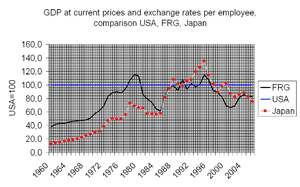Is this the “new normal” or a temporary bump on the long road to material prosperity?
EARLIER this week, the American Bureau of Labor Statistics said that labour productivity (output divided by hours worked) grew faster in the second quarter than previously believed. However, despite the seeming good news, the overall trend has been deeply underwhelming. Is this the “new normal” or a temporary bump on the long road to material prosperity?
Before 1750, the standard of living improved at a glacial pace, if at all. Farming in the early 18th century was not that different from farming in Biblical times. The Romans had invented plumbing before the very concept was forgotten for millennia. Then, something happened. Within two centuries the biggest material problems of pre-industrial life had been solved: food was plentiful, water was clean, indoor temperatures were controlled, and distance no longer prevented the speedy transit of goods and messages. Devastating wars and deep depressions did nothing to slow this forward march of progress. Since 1970, however, the observed rate of technological advancement has slowed sharply, despite the temporary bump from the internet.
I’ve been thinking about this after recently reading Robert Gordon’s newest paper (via Alphaville). Mr Gordon is an economist at America’s Northwestern University known for his skepticism of the “New Economy” in the 1990s. He believes the poor performance since 1970 is a harbinger of things to come.
The paper begins with a sensible proposition: “The rapid progress made over the past 250 years could well be a unique episode in human history rather than a guarantee of endless future advance at the same rate.” This caution is reasonable. Many of the world’s worst predictions can be blamed on the mindless extrapolation of the recent past endlessly into the future. But this cuts both ways. Mr Gordon’s main piece of evidence is the relatively disappointing productivity performance of the past four decades—a point he spends more than half of the paper belabouring.
On top of the innovation slowdown, Mr Gordon argues that six additional “headwinds” will depress the U.S. economy even further: aging, debt repayment, a broken education system, global labour arbitrage, inequality, and pollution. After cumulating these forces in a “provocative exercise in subtraction,” Mr Gordon forecasts that the standard of living for an American in the bottom 99% of the income distribution will barely increase for one hundred years. Fortunately, both parts of this claim are overdone.
via The Economist – M.C.K.
The Latest Streaming News: Productivity and growth updated minute-by-minute
Bookmark this page and come back often
Latest NEWS
Latest VIDEO








